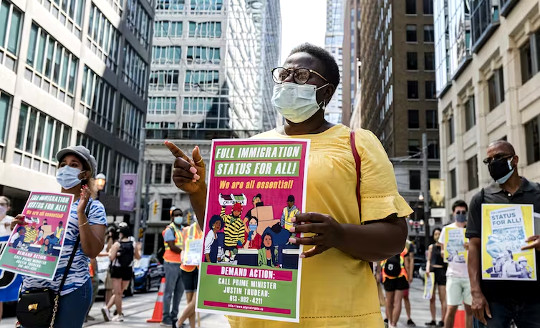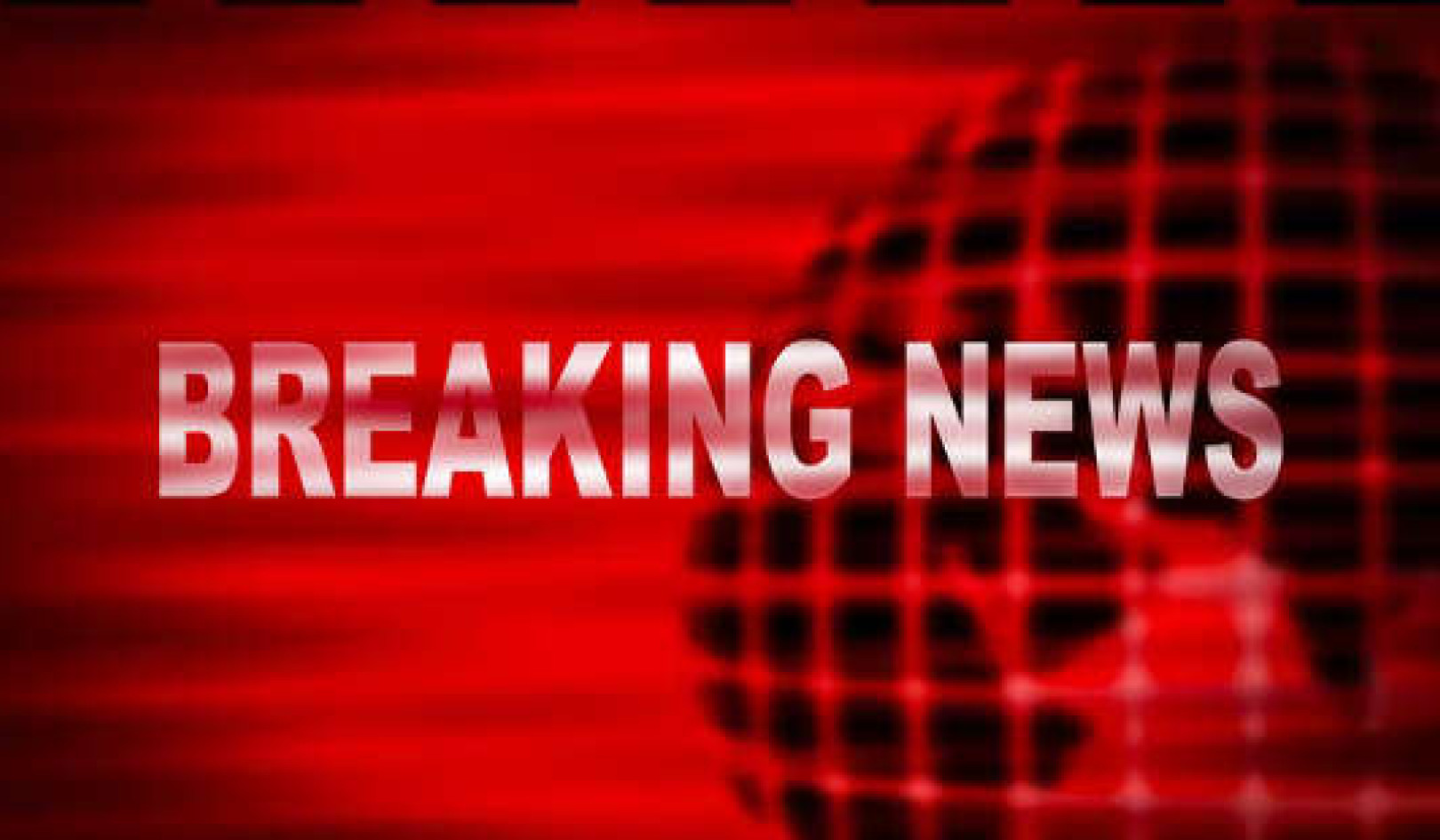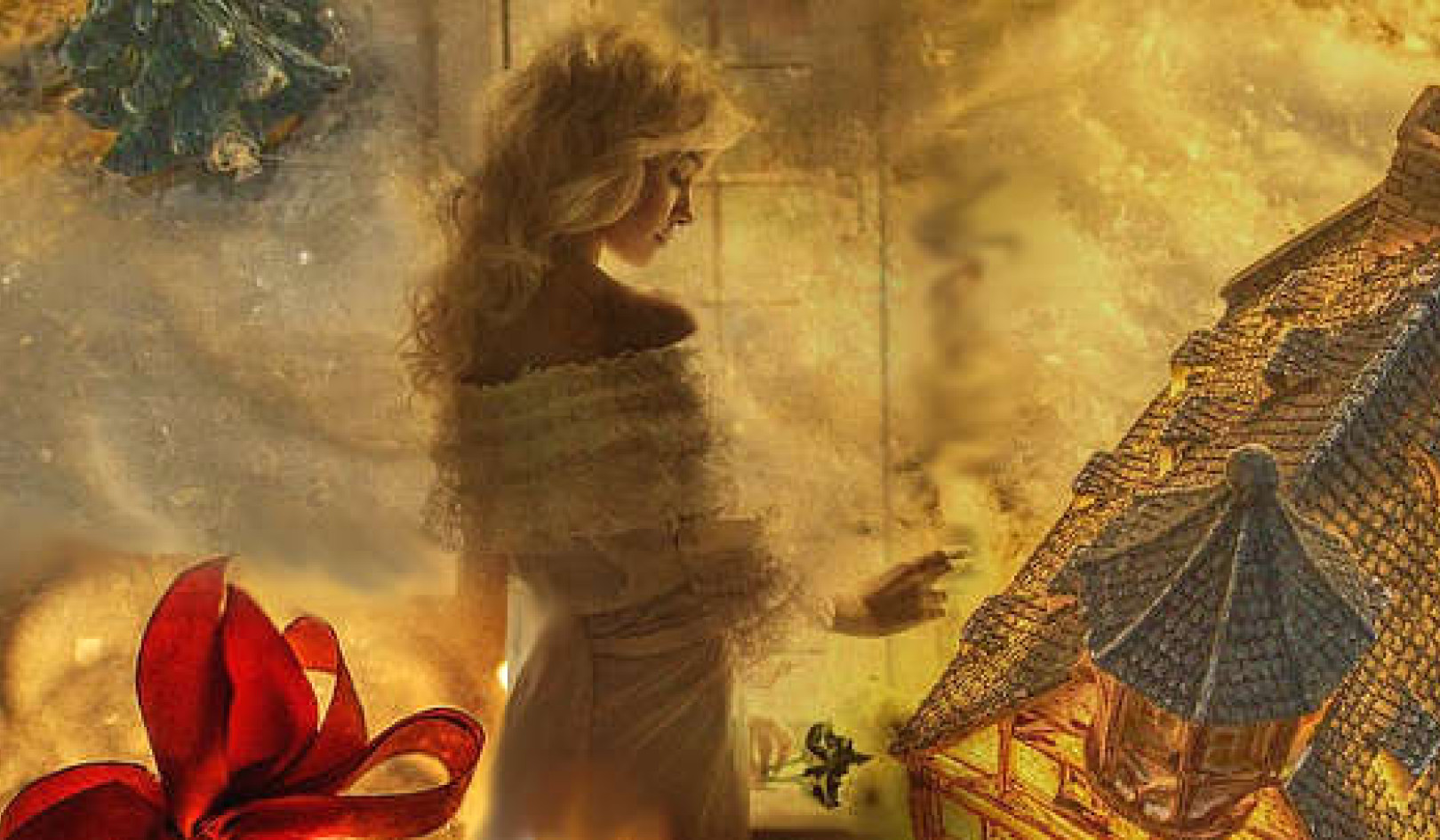
International human rights mechanisms alone cannot offer reliable solutions to racism, including racism affecting racialized migrants. Protestors support migrant worker rights in front of the Immigration and Refugee Board of Canada, in Toronto, in August 2020. THE CANADIAN PRESS/Christopher Katsarov
I teach a course on race, racialization, racism and human rights. In my classes and some of my research, I highlight empathy, personhood and respect for human dignity as fundamental to overcoming racism.
On the International Day for the Elimination of Racial Discrimination, a student asked: Why does racism still exist against Black people, Indigenous people and people of colour when we have national and international mechanisms built upon notions of human dignity, equal rights and freedom?
National and international human rights mechanisms do not seem to provide reliable solutions to racism. They are tokenistic gestures that silence the consciousness of those benefiting from racialized systems and institutions.
Mechanisms for addressing racism
Mechanisms like the Canadian Constitution, the Universal Declaration of Human Rights (1948) and the International Convention on the Elimination of All Forms of Racial Discrimination (1965) don’t address the root causes of racism and do not seem to provide reliable solutions to racism.
After the killing of George Floyd, people protested against anti-Black racism and against all forms of racism have become common. However, racism remains engraved in Canadian and global society.
Nineteen racialized students from my class remarked they are traumatized, because since childhood they have lived in fear of being stopped by police, incarcerated or killed because of their skin colour. Others lamented how their parents, with qualifications including doctorates, do precarious jobs.
One student said that in Canada, we hide behind race-neutral excuses, multiculturalism, the cultural mosaic and the myth that Canada is more welcoming than the United States.
What is human dignity and personhood?
Western theories of human dignity denote basic and inherent worth that belongs to all people. In philosophy, Cicero introduced the idea of “the dignity of the human race.”
The philosopher Immanuel Kant, in his 1785 Groundwork for the Metaphysics of Morals, argued that every person has inherent dignity or value which demands moral respect in treating them.
Kant emphasized that every person has the obligation to always treat the Other “as an end” and “never merely as a means.” It is not only about treating others as you would like them to treat you, but behaving in a way that your conduct could be a model for universal laws.
In western law, human dignity is key to interpreting human rights and adjudication.
Yet clearly, factors beyond these have shaped our societies.
Greed, capitalism and racism
Slavery and colonialism emerged historically in racial capitalism, meaning that a denial of the dignity, rights and humanity of groups of African and Indigenous people was an intrinsic aspect of justifying economic control of their bodies, lands and resources.
Today, the denial of “others’” humanity to enable brutal violence and exploitation for profits continues to deny the dignity, rights and humanity of the racialized, and to commodify, objectify and kill them.
For example, the Democratic Republic of Congo (DRC), rich with gold, diamonds, coltan and the critical minerals needed for transitioning to renewable energy, is exposed to corporate resource extraction.
In the Global North electronic vehicles and lithium batteries are considered a game changer for mitigating climate change. However, the extraction of minerals displaces communities, engenders deforestation, pollutes land, air and water and exposes people to diseases, poverty and incessant armed conflicts.
Since 1996, the DRC has been embroiled in violence that even UN peacekeepers have failed to de-escalate.
Dismantling racism
Without dismantling racism, we cannot achieve sustainable development goals, global peace and security.
We need mechanisms and policies designed with the involvement of well-informed young people (like the ones I teach) who are determined to create new societies where every person’s dignity and humanity matters.
We need to dismantle racial capitalism that commodifies, objectifies and exploits the “other” and the planet to accumulate capital for a few. This implies being concerned with the humanity of others, including migrants: While Canada and the western world welcomed Ukrainians wholeheartedly, the same has not been the case for racialized migrants.
‘Obligations to the collective’
We need to notice each other’s personhood and be informed by wisdoms that acknowledge, affirm and celebrate our human and ecological interdependence.
Geographer Nicole Gombay examined how in Nunavut, “struggles of co-existence between a model of personhood founded in the gift and based on obligations to the collective,” seen in Inuit society, contrasted to colonial models “of personhood associated with individual rights and the market economy.”
The concept of Ubuntu, which has roots in humanist African philosophy, is based on personhood, the dignity of every person and interdependence among people. Translated, Ubuntu is “I am because we are and because we are, therefore I am.”
Desmond Tutu wrote that “Ubuntu is the essence of being human… We are different in order to know our need of each other.”
Need for liberation
Racism hurts the oppressed and exposes the indignity of the oppressor, highlighting the necessity to liberate both. When Nelson Mandela became South Africa’s president after 27 years of incarceration, he was committed to respecting the dignity and humanity of all races.
Mandela wrote that dismantling apartheid required liberating the oppressed and the oppressor.
The great Brazilian educator Paulo Freire was also committed to liberating the oppressor and the oppressed, the racist and the racialized. The oppressors who use their power to oppress, exploit and racialize “cannot find in this power the strength to liberate either the oppressed or themselves. Only power that springs from the weakness of the oppressed will be sufficiently strong to free both.”
A key implication of this is that the oppressed, though “weak” because they are denied agency even in issues pertaining to their well-being, alone understand their condition. They are better situated in creating social, political and economic processes for change.PRESS/Nathan Denette
Racism affects us all
Parents and educators have an obligation to teach and exemplify empathy, love, care and respect for every person.
As Mandela noted, people “learn to hate, and if they can learn to hate, they can be taught to love, for love comes more naturally to the human heart.”
Racism affects us all. When we understand this as individuals and as a society, we stop denying it and start asking: How is racism operating in our midst?
Then, we have a chance of recognizing how racism saps our strength that lies in diversity and interdependence.![]()
About The Author
Evelyn Namakula Mayanja, Assistant Professor, Interdisciplinary Studies, Carleton University
This article is republished from The Conversation under a Creative Commons license. Read the original article.

Books Improving Attitude and Behavior from Amazon's Best Sellers list
"Atomic Habits: An Easy & Proven Way to Build Good Habits & Break Bad Ones"
by James Clear
In this book, James Clear presents a comprehensive guide to building good habits and breaking bad ones. The book includes practical advice and strategies for creating lasting behavior change, based on the latest research in psychology and neuroscience.
Click for more info or to order
"Unf*ck Your Brain: Using Science to Get Over Anxiety, Depression, Anger, Freak-Outs, and Triggers"
by Faith G. Harper, PhD, LPC-S, ACS, ACN
In this book, Dr. Faith Harper offers a guide to understanding and managing common emotional and behavioral issues, including anxiety, depression, and anger. The book includes information on the science behind these issues, as well as practical advice and exercises for coping and healing.
Click for more info or to order
"The Power of Habit: Why We Do What We Do in Life and Business"
by Charles Duhigg
In this book, Charles Duhigg explores the science of habit formation and how habits impact our lives, both personally and professionally. The book includes stories of individuals and organizations who have successfully changed their habits, as well as practical advice for creating lasting behavior change.
Click for more info or to order
"Tiny Habits: The Small Changes That Change Everything"
by BJ Fogg
In this book, BJ Fogg presents a guide to creating lasting behavior change through small, incremental habits. The book includes practical advice and strategies for identifying and implementing tiny habits that can lead to big changes over time.
Click for more info or to order
"The 5 AM Club: Own Your Morning, Elevate Your Life"
by Robin Sharma
In this book, Robin Sharma presents a guide to maximizing your productivity and potential by starting your day early. The book includes practical advice and strategies for creating a morning routine that supports your goals and values, as well as inspiring stories of individuals who have transformed their lives through early rising.





















